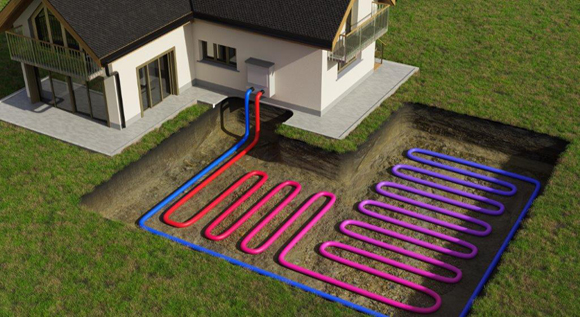Let’s see those heat pumps
Half a million heat pumps are to be installed each year in Germany from 2024, enabling the energy transition to make quicker progress – not least in the buildings sector. There is a lot of work to be done. A key issues paper serves to pave the way forward.
 © Adobe Stock / vchalup
© Adobe Stock / vchalup
As it gets cold outside, we start to turn the heating up inside. Our hot water consumption also increases. Too much of the energy we use to heat indoor spaces and water still comes from fossil sources. The widespread deployment of heat pumps is intended to remedy this and enable the use of more renewable energy here. Speeding up the energy transition in the buildings sector is an important building block to increasing energy efficiency and meeting climate targets.
Some 500,000 heat pumps to be installed every year from 2024
To help the heat transition on its way, the Federal Government held the second heat pump summit of the year on 16 November. The stated aim is to install 500,000 heat pumps every year from 2024. To put this into perspective: in 2021, this figure was 154,000. There is much to be improved and accelerated so that this target can be reached. A key issues paper adopted at the summit now paves the way to achieving this and includes specific projects and measures. The focus is on the issues surrounding production development, skilled labour and the housing sector.
„We need to expand production capacities in Germany and Europe. Safeguarding supply chains is of immense importance here. We need a strong European supplier industry so that we can source components such as compressors, semiconductors, chips, and control and regulation technology locally. One approach can be to use the European Platform for Transformation Technologies,” said Federal Minister for Economic Affairs and Climate Action Robert Habeck. In parallel to this, product development is to be further advanced in collaboration with research institutions.
Skilled labour: new training courses on heat pumps and renewables
To attract more heat pump specialists, the skilled crafts sector is planning a new advanced training qualification to become a Certified Vocational Specialist in Heat Pumps. Trainees can get started right away with an apprenticeship to become an Electronics Engineer for Building Systems Integration. The expansion of the opportunities for initial and further training offered by the sector will be complemented by the Heat Pump Development Programme, which, from the spring of 2023, will encourage trained professionals in the skilled crafts sector, planners and energy consultants to participate in training specifically on the topic of heat pumps. The central associations of the skilled crafts sector, of sanitary, heating and air-conditioning technology, and of electrical engineering have also concluded an agreement to be able to better coordinate the installation of heat pumps. Installation times are to be shortened and the scarce capacity of skilled labour more effectively and efficiently deployed.
Heat pumps to also become standard in blocks of flats
Previously, heat pumps have primarily been used in newly built detached homes; from 2023, however, they will also increasingly provide heat and hot water in blocks of flats. Best practice approaches for the housing sector will also be bundled together in guidelines for the installation of heat pumps in existing blocks of flats. Framework agreements between the housing sector and heat pump manufacturers are under discussion. The background to this is that specific types of heat pumps are required in blocks of flats. These have higher output categories than those used in detached homes. The right products for this in the required quantity have not yet been available on the market. There will also be new funding models based on energy services, for example for homeowners’ associations. This would establish heat pumps as the standard technology in buildings with several owners.

